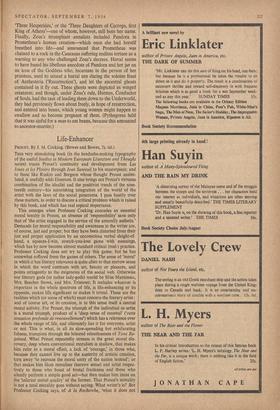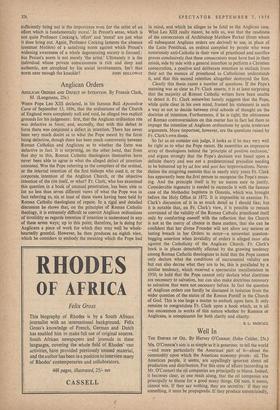Life-Enhancer
PROUST. By J. M. Cocking. (Bowes and Bowes, 7s. 6d.) THIS very stimulating book (in the headache-making typography of the useful Studies in Modern European Literature and Thought series) traces Proust's continuity and development from Les lours at les Plaisirs through Jean Santeuil to his masterpiece; and to those like Ruskin and Bergson whose thought Proust assimi- lated, it usefully adds Emerson. It also brings out Proust's virtuoso combination of the idealist and the positivist trends of the nine- teenth century—his astonishing integration of the world of the artist with the laws of the social panorama. I pass hastily over these matters, in order to discuss a critical problem which is raised by this book, and which has real topical importance.
This emerges when Professor Cocking concedes an essential moral tenuity in Proust, an absence of 'responsibility' save only that of 'the artist engaged in the service of the amorally aesthetic.' Demands for moral responsibility and awareness in the writer are, of course, just and proper; but they have been distorted from their just and proper application by an unconscious verbal sleight-of- hand, a squeeze-I-win, stretch-you-lose game with meanings, which has by now become almost standard critical (mal-) practice. Professor Cocking does not try to play this game; but he has somewhat suffered from the games of others. The sense of 'moral' in which it has literary relevance is quite alien to that narrow sense in which the word contrasts with art, beauty or pleasure, and points stringently to the exigencies of the social web. Otherwise our literary gods (or rather lady-gods) would be Miss Martineau, Mrs. Beecher Stowe, and Mrs. Trimmer. It includes whatever is important in the whole spectrum of life, is life-enhancing or its opposite, makes life significant or makes it trivial. These are the realities which (or some of which) must concern the literary artist : and of course art, or its creation, is in this sense itself a central moral activity. For Proust. the triumph of the individual as artist is a moral triumph, product of a 'deep sense of renewal' ('cette sensation prof onde de renouvellement') which has a relevance over the whole range of life, and ultimately has it for everyone, artist or not. This is what, in all its slow-spreading but exhilarating fulness, transpires through the leisured relentlessness of Time Re- gained. What Proust repeatedly stresses is the great moral dis- covery, deep where conventional moralism is shallow, that makes him refer to a moral effect, a lack of 'courage,' in those who, because they cannot live up to the austerity of artistic creation, turn away `to recreate the moral unity of the nation instead'; or that makes him liken moraliser (narrow sense) and artist respec- tively to those who boast of brutal frankness and those who silently perform a simple good act—but then makes him insist on, the 'inferior moral quality' of the former. That Proust's morality is not a total morality goes without saying. What writer's is? But Professor Cocking says, of A la Recherche, 'what it does not
sufficiently bring out is the importance even for the artist of an effort which is fundamentally moral.' In Proust's sense, which is not quite Professor Cocking's, 'effort' and 'moral' are just what it does bring out. Again, Professor Cocking laments the absence (contrast Moliere) of a satisfying norm against which Proust's widening awareness of a whole degenerating society is focused : but Proust's norm is not merely 'the artist.' Ultimately it is the individual whose private consciousness is rich and deep and authentic, not atrophied by his social involvements. Isn't that



































 Previous page
Previous page